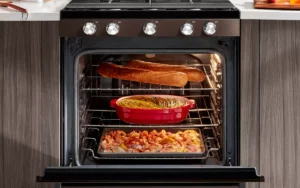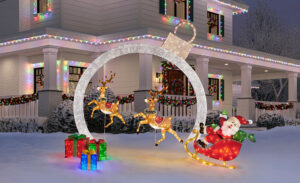Winter weather can make plumbing issues even more frustrating, and clogged drains are no exception. Cold temperatures can cause grease to solidify, debris to build up faster, and pipes to become more vulnerable. Preventing clogs is easier (and cheaper!) than dealing with a full-on blockage or frozen pipe. Here are simple tips to keep your drains flowing smoothly all winter long.
1. Be Mindful of Grease and Oils
Cooking grease is one of the most common culprits of winter drain clogs. Cold temperatures cause grease and oils to harden faster, creating stubborn blockages.
- What to do:
- Avoid pouring grease, oil, or fat down the sink.
- Let grease cool, then scrape it into a disposable container or can before throwing it in the trash.
- Wipe greasy pots and pans with a paper towel before washing them to prevent residue from entering the drain.
- Pro Tip: Use a sink strainer to catch small bits of food or grease-laden debris that could cause buildup.
- Why it works: Keeping grease out of the drain prevents it from solidifying inside pipes and creating blockages.
2. Run Hot Water After Each Use
Hot water can help prevent buildup in your drains, especially after washing dishes or cooking.
- What to do:
- Run hot water for at least 20-30 seconds after using the sink to flush out any residue.
- Pour boiling water down the drain once a week to break up small amounts of grease or soap scum.
- Use caution with boiling water on older pipes or PVC pipes, as it may cause damage.
- Why it works: Hot water melts any grease or debris and pushes it through the pipes before it has a chance to stick.
3. Use a Drain Strainer
Small debris like food scraps, coffee grounds, or hair can quickly clog drains if they slip through.
- What to do:
- Place a mesh or metal drain strainer over your kitchen sink and shower drains.
- Regularly clean the strainer to ensure water can flow freely.
- Use fine-mesh strainers for bathroom sinks to catch soap scum, hair, and toothpaste buildup.
- Why it works: Strainers act as a physical barrier, stopping debris before it reaches your pipes.
4. Avoid Overloading Your Garbage Disposal
During winter months, holiday cooking and gatherings often lead to overuse of garbage disposals. Misuse can clog pipes quickly.
- What to do:
- Avoid putting fibrous foods like potato peels, celery, or onion skins down the disposal.
- Never grind large quantities of food scraps at once—feed small amounts slowly.
- Always run cold water while using the garbage disposal and keep it running for 20 seconds after turning it off.
- Pro Tip: Freshen your disposal weekly by grinding a mix of ice cubes, baking soda, and lemon slices.
- Why it works: Proper garbage disposal use prevents blockages and keeps drains clear and odor-free.
5. Keep Bathroom Drains Hair-Free
Hair and soap scum are a dangerous combo for bathroom sinks, showers, and tub drains.
- What to do:
- Use a hair catcher or drain cover to trap hair before it enters the drain.
- Remove visible hair from the drain after each shower or bath.
- Pour a cup of baking soda and white vinegar down the drain once a month to break up soap scum and grime.
- Why it works: Regular maintenance prevents hair from tangling with soap residue and forming clogs over time.
6. Insulate Pipes in Unheated Areas
Cold pipes in basements, garages, or crawl spaces are more prone to freezing, which can worsen existing clogs.
- What to do:
- Wrap exposed pipes with foam insulation sleeves, heat tape, or blankets to keep them warm.
- Keep cabinet doors open to allow warm air to circulate around pipes under sinks.
- Run a slow trickle of water during freezing temperatures to keep water moving.
- Why it works: Insulating pipes reduces the risk of freezing, which can exacerbate clogs and damage your plumbing system.
7. Clean Your Drains Monthly
Preventative cleaning keeps buildup from turning into full blockages.
- What to do:
- Use a natural cleaner: Pour 1 cup of baking soda followed by 1 cup of white vinegar into the drain. Let it sit for 15 minutes, then flush with hot water.
- Avoid chemical drain cleaners, which can damage pipes over time.
- Use a drain snake or auger to clear minor clogs before they get worse.
- Pro Tip: For stubborn buildup, a plumber can professionally clean your drains to ensure long-term functionality.
- Why it works: Routine cleaning breaks up small clogs before they have time to grow into larger problems.
8. Watch Out for Frozen Pipes
Frozen pipes are a major winter issue and can worsen blockages caused by debris or grease.
- What to do:
- Keep your home’s thermostat set to at least 55°F (13°C), even if you’re away.
- Let faucets drip slowly during freezing temperatures to keep water moving.
- Insulate pipes in unheated areas (basements, attics, garages) to prevent freezing.
- Why it works: Moving water and insulation prevent pipes from freezing, reducing the risk of clogs and bursts.
9. Dispose of Waste Properly
Not everything belongs down your drains! Improper disposal of household waste is a common cause of winter clogs.
- What to do:
- Avoid flushing wipes, cotton swabs, feminine products, or paper towels down toilets.
- Dispose of coffee grounds, eggshells, and bones in the trash instead of the garbage disposal.
- Use trash cans and compost bins for items that shouldn’t enter your plumbing.
- Why it works: Proper waste disposal reduces stress on your plumbing and minimizes clogs.
10. Schedule a Plumbing Inspection
A professional inspection can help catch small issues before they turn into major headaches.
- What to do:
- Hire a plumber to inspect drains, pipes, and water flow before winter temperatures drop.
- Ask about preventative maintenance, such as drain snaking or hydro-jetting, for tough buildup.
- Why it works: Professional inspections ensure your plumbing is ready for the demands of winter and can help prevent costly clogs and repairs.
Final Thoughts: Keep Drains Clear and Stress-Free
Winter can be tough on your plumbing, but by being proactive, you can avoid frustrating drain clogs and costly repairs. From mindful grease disposal to monthly cleaning and proper pipe insulation, these simple tips will help keep your drains flowing smoothly all season long. With a little preparation, you’ll enjoy a stress-free winter and a happy, clog-free home!








